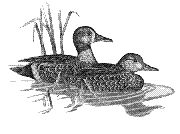
United States Fish and Wildlife Service
Waterfowl Management Handbook
1995
13.1.8. Life History and Management of the Blue-winged Teal, James H. Gammonley and Leigh H. Fredrickson
1993
13.1.15. Life History and Habitat Needs of the Black Brant, Dirk V. Derksen and David H. Ward
13.2.2. The North American Waterfowl Management Plan: A New Approach to Wetland Conservation, Angela V. Graziano and Diana H. Cross
13.4.8. Options for Water-level Control in Developed Wetlands, J. R. Kelley Jr., M. K. Laubhan, F. A. Reid, J. S. Wortham, and L. H. Fredrickson
13.2.11. Increasing Waterfowl Nesting Success on Islands and Peninsulas, John T. Lokemoen
13.3.14. Detrital Accumulation and Processing in Wetlands, Patrick A. Magee
13.1.11. Life History Traits and Habitat Needs of the Redhead, Christine Mitchell Custer
13.4.13. Management and Control of Cattails, Richard S. Sojda and Kent L. Solberg
1992
13.1.6. Life History and Habitat Needs of the Wood Duck, Katie M. Dugger and Leigh H. Fredrickson
13.2.14. Management of Habitat for Breeding and Migrating Shorebirds in the Midwest, Jan Eldridge
13.3.7. Ecology of Playa Lakes, David A. Haukos and Loren M. Smith
13.2.15. Human Disturbances of Waterfowl: Causes, Effects, and Management, Carl E. Korschgen and Robert B. Dahlgren
13.4.5. A Technique for Estimating Seed Production of Common Moist-soil Plants, Murray Laubhan
13.2.7. Identifying the Factors That Limit Duck Production, James K. Ringelman
13.3.6. Ecology of Montane Wetlands, James K. Ringelman
1991
13.4.6. Strategies for Water Level Manipulations in Moist-soil Systems, Leigh H. Fredrickson
13.1.3. Life History Strategies and Habitat Needs of the Northern Pintail, Leigh H. Fredrickson and Mickey E. Heitmeyer
13.4.18. Chufa Biology and Management, James R. Kelley Jr. and Leigh H. Fredrickson
13.4.7. Managing Beaver to Benefit Waterfowl, James K. Ringelman
13.2.8. Rescue and Rehabilitation of Oiled Birds, Sallie Welte and Lynne Frink
1990
13.2.12. Artificial Nest Structures for Canada Geese, I. J. Ball
13.3.3. Aquatic Invertebrates Important for Waterfowl Production, Jan Eldridge
13.3.3. Aquatic Invertebrates Important for Waterfowl Production, Jan Eldridge
13.3.5. Ecology of Northern Prairie Wetlands, Jan Eldridge
13.1.2 Life History Traits and Management of the Gadwall, James K. Ringelman
13.2.10. Decoy Traps for Ducks, James K. Ringelman
13.4.3. Managing Agricultural Foods for Waterfowl, James K. Ringelman
13.4.4. Habitat Management for Molting Waterfowl, James K. Ringelman
13.4.2. Economic and Legal Incentives for Waterfowl Management on Private Lands, Richard D. Schultz
1989
13.4.12. Control of Phragmites or Common Reed, Diana H. Cross and Karen L. Fleming
13.2.5. Avian Cholera: A Major New Cause of Waterfowl Mortality, Milton Friend
13.2.6. Lead Poisoning: The Invisible Disease, Milton Friend
13.2.4. Avian Botulism: Geographic Expansion of a Historic Disease, Louis N. Locke and Milton N. Friend
13.4.11. Control of Purple Loosestrife, Daniel Q. Thompson
1988
Complete Waterfowl Management Handbook
13.3.1. Invertebrate Response to Wetland Management, Leigh H. Fredrickson
13.1.1. Nutritional Values of Waterfowl Foods, Leigh H. Fredrickson and Frederic A. Reid
13.2.1. Waterfowl Use of Wetland Complexes, Leigh H. Fredrickson and Frederic A. Reid
13.3.2. Initial Considerations for Sampling Wetland Invertebrates, Leigh H. Fredrickson and Frederic A. Reid
13.4.10. Control of Willow and Cottonwood Seedlings in Herbaceous Wetlands, Leigh H. Fredrickson and Frederic A. Reid
13.4.1. Considerations of Community Characteristics for Sampling Vegetation, Leigh H. Fredrickson and Frederic A. Reid
13.4.9. Preliminary Considerations for Manipulating Vegetation, Leigh H. Fredrickson and Frederic A. Reid

